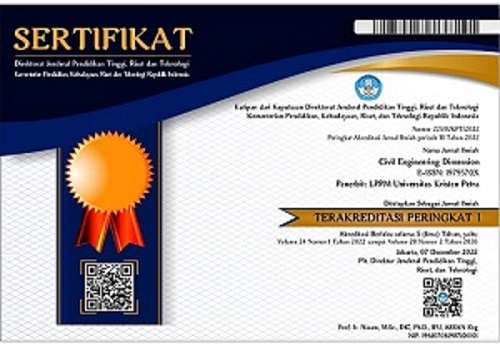UTILIZATION OF UNCONTROLLED BURNT RICE HUSK ASH IN SOIL IMPROVEMENT
 :
:
https://doi.org/10.9744/ced.4.2.pp.%20100-105
Abstract
Expansive soil has been a problem in Indonesia as in other countries. Current research found that there is a potential use of silica waste%2C resulting from burnt rice husk%2C as a pozzolanic material. This paper presents the results of study on the utilisation of ashes produced from uncontrolled rice husk burnt in Yogyakarta %28Indonesia%29.%0D%0A%0D%0AIn this research%2C a series of laboratory tests has been conducted. The tests were carried out individually or in a combination in which the Rice Husk Ash %28RHA%29 content were varied from 7.5%2C 10%2C and 12.5 percent%2C and the lime content from 2%2C 4%2C 6%2C and 10 percent %28by the dry weight of soil%29. All the samples have been remoulded at their optimum moisture content %28OMC%29 and maximum dry density %28MDD%29. The research shows that lime - rice husk ash decreased the swell of expansive soil and improved its strength and bearing capacity.%0D%0AAbstract in Bahasa Indonesia :
soil+improvement%2C+expansive+soil%2C+uncontrolled+-+burnt%2C+rice+husk+ash.
Downloads
Published
2004-06-02
How to Cite
Muntohar, A. S. (2004). UTILIZATION OF UNCONTROLLED BURNT RICE HUSK ASH IN SOIL IMPROVEMENT. Civil Engineering Dimension, 4(2), pp. 100-105. https://doi.org/10.9744/ced.4.2.pp. 100-105
Issue
Section
Articles
License
Authors who publish with this journal agree to the following terms:- Authors retain the copyright and publishing right, and grant the journal right of first publication with the work simultaneously licensed under a Creative Commons Attribution License that allows others to share the work with an acknowledgement of the work's authorship and initial publication in this journal.
- Authors are able to enter into separate, additional contractual arrangements for the non-exclusive distribution of the journal's published version of the work (e.g., post it to an institutional repository or publish it in a book), with an acknowledgement of its initial publication in this journal.
- Authors are permitted and encouraged to post their work online (e.g., in institutional repositories or on their website) followingthe publication of the article, as it can lead to productive exchanges, as well as earlier and greater citation of published work (See The Effect of Open Access).
















